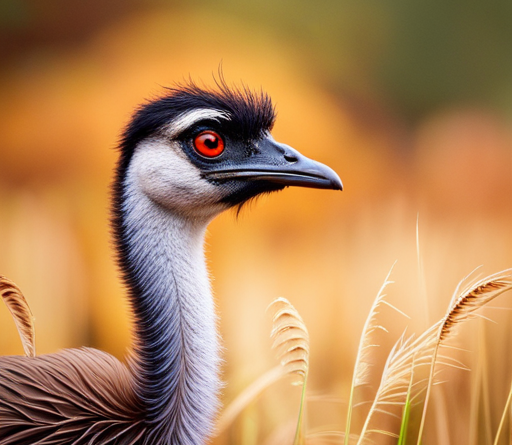
Explore the enchanting world of Emus in eco-tourism, where these majestic birds take center stage. Discover the delightful dance of nature and nurture as you delve into the role of Emus in conservation efforts.
Get up close and personal with these fascinating creatures, as they become ambassadors for environmental education. Experience the economic benefits of Emu tourism, while immersing yourself in the cultural exchange within local communities.
Stay at emu-friendly accommodations, where sustainable experiences await. Together, let’s ensure a bright future for these remarkable birds through Emu conservation.
Embark on a journey like no other and witness the harmony between humans and emus unfold before your very eyes.
Key Takeaways
- Emu feeding experiences and close encounters provide a unique opportunity to connect with nature and appreciate the beauty and majesty of these birds.
- Emus play a role in conservation efforts and environmental education through wildlife rehabilitation, raising awareness about protecting wildlife and habitats, and contributing to eco-tourism initiatives.
- Emu tourism boosts the local economy by generating revenue, creating job opportunities in various sectors, and supporting sustainable practices in accommodations.
- Emus serve as a source of cultural exchange between visitors and local communities, fostering appreciation for indigenous cultures and supporting local artisans.
Emus: A Unique Addition to Eco-Tourism
Emus can be a one-of-a-kind addition to your eco-tourism experience by allowing you to interact with these fascinating creatures up close and personal. Interacting with emus offers a unique opportunity for a truly intimate encounter with these magnificent birds. One of the most popular activities among eco-tourists is emu feeding experiences, where you can observe their behavior and even participate in their daily feeding routine.
During these experiences, you’ll have the chance to get up close and personal with emus, as you learn about their natural habitat, diet, and behavior. Emus are known for their curious nature, and they often approach humans with a sense of intrigue. As you interact with them, you’ll witness their gentle demeanor and their inquisitive nature.
Emu feeding experiences provide a hands-on and educational opportunity to learn about these incredible creatures. You’ll have the chance to feed emus, getting a firsthand experience of their feeding habits and observing their unique feeding technique. It’s an unforgettable experience that allows you to connect with nature in a profound way.
As we delve into the role of emus in conservation efforts, it’s important to recognize the value of these interactive experiences in raising awareness and fostering a sense of appreciation for these magnificent birds.
The Role of Emus in Conservation Efforts
By participating in emu conservation efforts, you can actively contribute to the preservation of these magnificent birds and their natural habitat. Emus play a crucial role in wildlife rehabilitation and serve as ambassadors for animal welfare. Here’s why their role in conservation is so important:
-
Emus in wildlife rehabilitation: Emus have proven to be valuable assets in the rehabilitation of injured or orphaned wildlife. Their calm demeanor and gentle nature make them ideal companions for animals in need of care and rehabilitation. Emus provide comfort and companionship, helping these animals recover and eventually be released back into the wild.
-
Emus as ambassadors for animal welfare: Emus are charismatic creatures that captivate the public’s attention. By showcasing emus in conservation efforts, they raise awareness about the importance of protecting wildlife and their habitats. Emus serve as ambassadors, helping to educate and inspire people to take action in preserving the natural world.
-
Conservation through ecotourism: Emus are a unique addition to eco-tourism initiatives. Visitors can learn about emus’ ecological significance, their role in the ecosystem, and the conservation efforts being undertaken to protect them. By supporting eco-tourism ventures that focus on emus, you’re directly contributing to their conservation.
Emu Encounters: Up Close and Personal
Get ready for an unforgettable experience with the emus as you come face to face with these magnificent birds. Emus have become popular attractions in eco-tourism due to their unique characteristics and close encounters they offer to visitors. These encounters provide an opportunity for people to observe emus up close and personal, allowing them to appreciate the beauty and majesty of these fascinating birds.
Emus, with their tall stature and distinctive appearance, captivate the attention of many. Their long necks and strong legs make them agile and graceful creatures. Up close, you can marvel at their intricately patterned feathers and their curious, intelligent eyes. This intimate encounter allows you to witness their natural behaviors, such as their curious pecking, gentle grooming, and impressive running abilities.
Emus as attractions in eco-tourism not only offer entertainment but also contribute to conservation efforts. By providing a platform for people to interact with these birds, it raises awareness about the importance of preserving their natural habitats and protecting their population. It fosters a sense of connection and responsibility towards these magnificent creatures.
In conclusion, close encounters with emus in eco-tourism settings provide a unique opportunity for intimate and educational experiences. These encounters allow visitors to appreciate the beauty and marvel at the remarkable adaptations of emus. Moreover, they serve as a powerful tool for raising awareness about conservation and the need to protect these fascinating birds and their habitats.
Emus as Ambassadors for Environmental Education
As you engage with emus in eco-tourism, they serve as ambassadors for environmental education, allowing you to gain a deeper understanding of the importance of preserving their natural habitats.
Emus in eco-tourism play a crucial role in promoting environmental education and conservation efforts. Here’s why:
-
Cultural exchange: Interacting with emus provides an opportunity for cultural exchange, where you can learn about the significance of these magnificent creatures in indigenous cultures.
-
Up close and personal encounters: Getting up close and personal with emus allows you to observe their behaviors, habitat requirements, and the challenges they face due to habitat loss and climate change.
-
Sustainable accommodations: Eco-tourism establishments that offer emu encounters often prioritize sustainable practices, promoting conservation efforts and minimizing their ecological footprint.
By serving as ambassadors, emus in eco-tourism contribute to environmental education by raising awareness about the importance of conserving their natural habitats. Through these encounters, you can witness the direct impact of human activities on their survival, fostering a sense of responsibility towards their conservation.
Understanding the role of emus in environmental education leads us to explore the economic benefits of emu tourism.
The Economic Benefits of Emu Tourism
As you delve into the world of emu tourism, you’ll discover the significant economic benefits associated with this thriving industry. Emu tourism has a substantial economic impact, generating revenue and contributing to the local economy. By attracting tourists and visitors from far and wide, emu tourism creates job opportunities and stimulates economic growth in the surrounding communities.
One of the primary economic benefits of emu tourism is job creation. As this industry continues to grow, it generates employment opportunities in various sectors. Local businesses, such as tour operators, accommodation providers, and restaurants, benefit from the influx of tourists seeking emu-related experiences. Additionally, emu farms and breeding facilities require personnel to care for the emus, further contributing to the creation of jobs.
Furthermore, emu tourism brings in revenue through various channels. Tourists spend money on accommodations, meals, transportation, and souvenirs, stimulating the local economy. Additionally, entrance fees to emu farms, guided tours, and educational programs generate income for these establishments. This revenue can then be reinvested into the community, supporting infrastructure development, conservation efforts, and other projects that benefit the area.
Emus and Cultural Exchange in Local Communities
Explore the cultural exchange that occurs between emus and local communities in the realm of eco-tourism.
Emus in eco-tourism not only bring economic benefits to local communities, but they also contribute to cultural immersion and community engagement. As visitors interact with emus in their natural habitat, they become part of a unique cultural experience that fosters a deeper understanding and appreciation for the local community.
Here are three key aspects of the cultural exchange between emus and local communities:
-
Traditional practices: Emus have long been revered by indigenous communities for their spiritual significance and as a source of food, clothing, and tools. Through eco-tourism, visitors have the opportunity to learn about these traditional practices and their cultural heritage, forging meaningful connections with the local community.
-
Language and storytelling: Emus are often depicted in traditional stories and legends, passed down through generations. Through eco-tourism activities such as storytelling sessions or language lessons, visitors can engage in the rich oral traditions of the local community, creating a sense of intimacy and cultural exchange.
-
Art and craftsmanship: Emus inspire local artisans to create beautiful artwork, from paintings and sculptures to intricate crafts. Visitors can witness firsthand the artistic talents of the local community, supporting their craftsmanship and contributing to the preservation of cultural traditions.
By participating in eco-tourism activities centered around emus, visitors have the opportunity to immerse themselves in the cultural richness of the local community. This cultural exchange fosters a deeper appreciation for diversity and creates lasting connections between visitors and the community.
With this understanding, let’s now explore how emu-friendly accommodations can further enhance sustainable experiences.
Emu-Friendly Accommodations: Creating Sustainable Experiences
To create sustainable experiences, consider staying at emu-friendly accommodations that prioritize environmental conservation and community engagement. These sustainable accommodations provide eco-friendly experiences that not only allow you to enjoy your stay but also contribute to the preservation of the environment and the well-being of local communities.
Emu-friendly accommodations go beyond the usual amenities and services offered by traditional hotels. They focus on minimizing their ecological footprint and fostering a sense of responsibility towards the environment. These accommodations often have initiatives in place to reduce energy and water consumption, promote recycling and waste management, and support local conservation efforts.
Additionally, emu-friendly accommodations actively engage with the local community. They collaborate with local businesses, hire local staff, and support community development projects. By staying at these accommodations, you can contribute to the local economy and help improve the livelihoods of the people living in the area.
To give you a better understanding of what to expect from emu-friendly accommodations, here is a table showcasing some of the sustainable practices and initiatives commonly found in these establishments:
| Sustainable Practices | Examples |
|---|---|
| Energy conservation | Renewable energy sources, energy-efficient appliances |
| Water conservation | Low-flow fixtures, rainwater harvesting |
| Waste management | Recycling programs, composting |
| Local engagement | Supporting local artisans, organizing community events |
| Environmental education | Guided nature walks, wildlife conservation talks |
| Support for local conservation | Donating a portion of profits to local conservation projects |
Emu Conservation: Ensuring a Bright Future for These Majestic Birds
When staying at emu-friendly accommodations, you can actively contribute to the conservation efforts that ensure a bright future for these majestic birds. Emu population numbers have been declining due to various factors such as habitat loss, predation, and climate change. However, through conservation initiatives, we can work together to protect and preserve these incredible creatures for generations to come.
Here are three ways in which you can help make a difference:
-
Support local conservation organizations: By donating to or volunteering with organizations dedicated to emu conservation, you can directly contribute to efforts aimed at protecting their habitats, conducting research, and implementing conservation strategies.
-
Choose eco-friendly tourism activities: Opt for eco-tours and activities that prioritize the well-being of emus and their habitats. This ensures that your visit is sustainable and minimizes any negative impact on the birds and their environment.
-
Spread awareness: Share your knowledge and experiences about emus with others. By raising awareness about the importance of emu conservation, you can inspire others to take action and support these initiatives.
Frequently Asked Questions
What Is the Average Lifespan of an Emu in the Wild?
The average lifespan of an emu in the wild is around 10-20 years.
Emus are fascinating creatures with unique mating habits. They form monogamous pairs during breeding season and the male takes on the role of incubating the eggs while the female ventures out to find other mates.
Emu conservation efforts are crucial to protect these magnificent birds and their habitats. Understanding their lifespan and mating habits helps in developing effective strategies for their preservation.
Are Emus Native to the Region Where Eco-Tourism Is Being Promoted?
Are emus native to the region where eco-tourism is being promoted?
Emus, with their unique appearance and fascinating behavior, have a significant impact on the local flora and fauna. Their foraging habits help disperse seeds, contributing to the ecological balance.
Moreover, emus hold cultural significance in the region, symbolizing strength and resilience. Understanding their native status is crucial for successful eco-tourism, as it allows visitors to appreciate the emus’ role in the ecosystem and immerse themselves in the rich cultural heritage associated with these majestic birds.
How Do Emus Contribute to the Local Ecosystem?
Emus, with their unique behavior patterns and conservation efforts, contribute significantly to the local ecosystem. By feeding on vegetation, they help control plant growth and maintain a balanced ecosystem.
Additionally, their droppings fertilize the soil, promoting healthy plant growth. Emus also play a role in seed dispersal, aiding in the regeneration of plant species.
These contributions highlight the importance of preserving and protecting emus as they continue to support the delicate balance of the local environment.
Are There Any Risks or Dangers Associated With Interacting Closely With Emus?
When it comes to interacting closely with emus, there are indeed risks and dangers to consider. While emus may appear docile, their large size and powerful legs can pose a threat if they feel threatened or agitated.
It’s essential to approach these magnificent creatures with caution and respect, maintaining a safe distance to avoid any potential harm. This is especially crucial in the context of eco-tourism, where the goal is to observe and appreciate wildlife while minimizing any negative impact on their natural behaviors and habitats.
Are There Any Specific Guidelines or Regulations in Place to Ensure the Welfare of Emus in Eco-Tourism Activities?
Are there any specific guidelines or regulations in place to ensure the welfare of emus in eco-tourism activities?
Yes, there are. Emu welfare guidelines and conservation efforts are essential in maintaining the well-being of these majestic creatures. These guidelines aim to protect emus from any potential harm or stress caused by interactions with humans during eco-tourism activities.
Conclusion
In conclusion, emus are a fascinating addition to eco-tourism, playing a vital role in conservation efforts and environmental education. Their close encounters provide a unique and sustainable experience for tourists, while also benefiting local communities economically.
With emu-friendly accommodations and a focus on cultural exchange, these majestic birds contribute to creating a brighter future for both themselves and the ecosystems they inhabit.
Emu tourism not only offers a scientific and informative experience but also ignites a sense of wonder and appreciation for the natural world.




